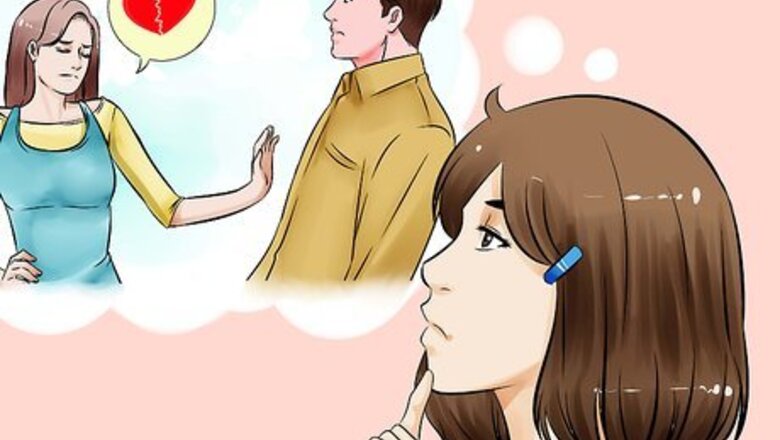
views
Rejecting Someone You Know
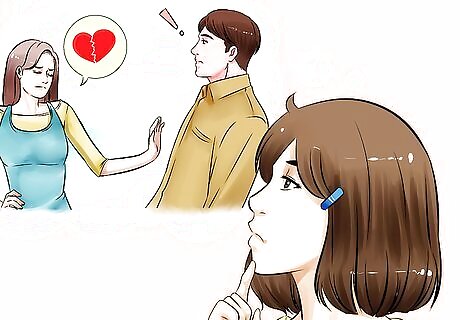
Prepare yourself. If you feel ready to turn down the romantic interest of someone after a couple of dates or a handful of social interactions, you’ve hopefully already thought through the consequences. You should be confident that this guy/girl isn’t for you, and accept that any existing friendship may never be the same (or even survive). Make sure you also prepare for the act of rejection as well. Think about what you'll say beforehand. Don't just tell them a straight out "no"; try to explain it in a way that's not harsh or cutting. Choose your words carefully. If you want to practice beforehand in the mirror, or with a sympathetic friend or sibling, do it. Make sure you are getting your message across clearly but compassionately. Be prepared to adapt, though, based on his/her reactions. You don’t want to sound like you’re reading from a script. Practice adjusting to various scenarios.
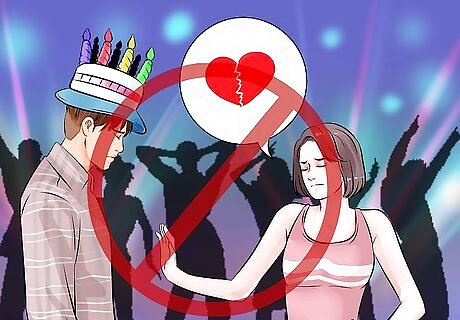
Don’t put it off. While it’s natural to want to put off unpleasant tasks, you’ll only make things worse by waiting once you know you want to end things. The longer you drag things out, the more likely the other person will think things are going great, making the rejection even more surprising and hurtful. Pick a good time to do it -- maybe not the person’s birthday or the night before a big test or job interview -- but don’t keep waiting for the “right time.” The right time is now. If you’re already in a long-term relationship with someone, many of the tips expressed here will be helpful, but there are unique challenges as well. Take a look at How to Break Up or How to Break Up with a Guy Nicely for ideas.
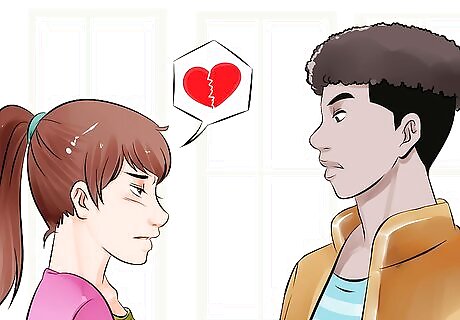
Do it in person. Of course it’s tempting to get it over with by text, email, phone call, etc., but bad news is best delivered in person, even in the modern digital age. This is especially true if you’re dealing with a friend you hope to keep as a friend. Show your maturity and respect. A face-to-face rejection allows you to immediately see how the other person is reacting to the news -- surprise, anger, maybe even relief -- and lets you adjust accordingly. Find a quiet, private (or at least semi-private) place to do the deed. No one wants to be rejected in the middle of a crowd, or not be sure of what they’re hearing. If you’re hesitant to be alone, at least find a semi-secluded part of the restaurant, shopping mall, club, etc.

Prepare them for what you're about to say. When the time arrives, don’t jump straight from asking how the pasta primavera was to “I think we should just be friends.” Loosen them up beforehand with some pleasant conversation, but don’t overdo it. You need to be able to transition to the serious business at hand without seeming flippant or thoughtless. Begin with a good transition to rejection mode -- perhaps something like "It's been great getting to know you, but..."; “I’ve been thinking a lot about this, and…”; or “I’m glad we tried this, but…”.
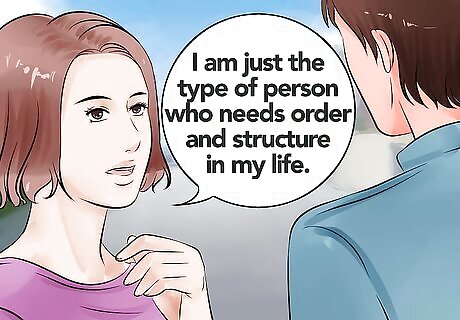
Be honest but kind. Yes, you want to tell the truth. Don’t make up stories about meeting someone else, reconnecting with an old flame, or deciding to join the Peace Corps. If they see through your fabrications or find out the truth later, things will only get more difficult. Give the real reasons for turning them away, but don’t blame them. Stick to “I” statements, where you focus on your needs, feelings, and perspectives. Yes, “it’s not you, it’s me” is an old cliché, but in principle it has value as a strategy. Instead of "I can't be with a disorganized slob whose life is a mess;" try "I am just the type of person who needs order and structure in my life." Talk about how you thought your [insert peculiarities here] would mesh with his/her [insert peculiarities here], and you’re glad you tried, but you don’t feel like it can work out.

Give them time to process it. Don't just give your reasons, say good-bye, and leave them hanging. Allow the person time to understand and possibly respond. If you don’t give the other person an opportunity to be involved in the process, it is easier for him/her to feel like it’s not really over or there’s still a chance. Be sympathetic and let the other person display sadness, cry, or even vent some frustration -- but you don’t have to stand for outright anger or verbal abuse.
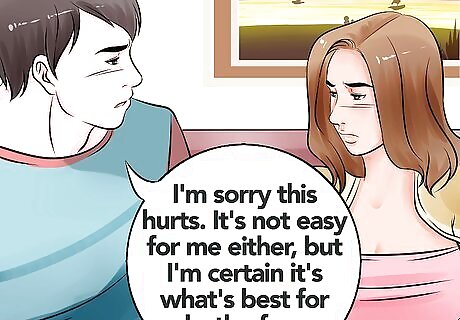
Stay strong and don't give in. The worst thing you can do is to retract your rejection because you feel sorry for the person or don't want to hurt him or her. You wouldn’t have started the process if you weren’t sure you wanted to finish it. Be appropriately apologetic, put a hand on the person’s shoulder, but don’t backtrack. Stick to your breakup “talking points.” Try "I'm sorry this hurts. It's not easy for me either, but I'm certain it's what's best for both of us." Don’t let the other person try to trap you by pointing out flaws in your reasoning; promising changes in exchange for reconsideration; or explaining that you have him or her all wrong. You’re not in a court of law. Don’t give any reason for false hope. Avoid saying you’re not ready “yet,” or want to try being “just friends” (even if you do want that, it's probably best to leave it for another time). The other person may sense seeds of doubt and another chance in the near future.
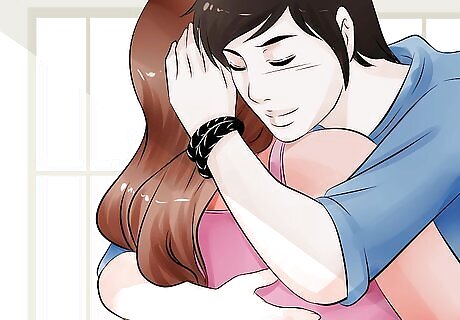
Don't end the conversation on a sour note. Try to encourage the other person and be kind. Let him/her know that they are a great person who just wasn’t right for you, but who will surely find someone great soon. Thank him/her for the chance to get to know each other and offer your best wishes.
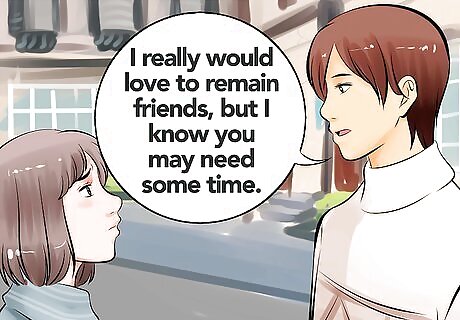
Take special care rejecting a friend who wants more. If you hope to remain friends with the person you’re rejecting, talk about how much you value your friendship, but don't use that as your only excuse. That is unlikely to satisfy the need for answers of someone who has just put this friendship on the line. Discuss why things you enjoy about the friendship wouldn't work as a romance. For instance: "I love how spontaneous and fun you are, and how I get to be that way with you as an escape; but you know that I'm someone who functions best with structure and consistency, and that's what I need in a romantic relationship." Accept the awkwardness of the situation. It's going to be a difficult, uncomfortable discussion, especially once you say "no." Don't make the person feel bad about putting the two of you in this situation ("Sooooo ... this is awkward, isn't it?"). Thank your friend for being honest about his or her true feelings. Accept that the friendship may end. The other person has already decided that he/she doesn't want things to continue as is. No matter your preference, there may be no going back. Try saying "I really would love to remain friends, but I know you may need some time. I'll be happy to talk to you about it again whenever you feel ready."
Rejecting Someone New
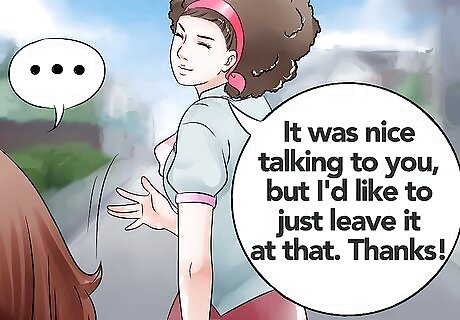
Be honest, direct, and kind. If it’s just some guy or girl you’ve been talking to at the bar, health club, motor vehicle bureau line, etc., it may be tempting to just make up an excuse to avoid going on a date. After all, you’re not likely to see the person again anytime soon. Then again, if you aren’t going to see him or her again, why not just be honest? A little temporary awkwardness will probably leave both of you feeling better in the end. Something as simple as "It was nice talking to you, but I'd like to just leave it at that. Thanks," might do the trick.
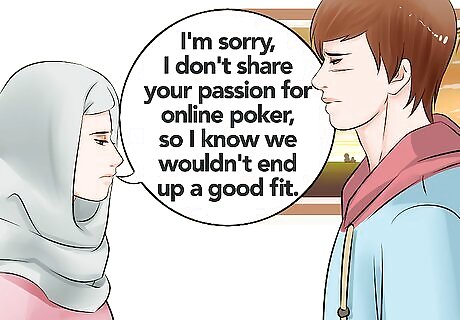
Get to the point. You won’t have the time for lots of preparation beforehand, as in readying to break-up with a new boyfriend/girlfriend, so don’t try to come up with a long explanation. Just be clear, concise, and honest about why you don’t want to pursue a relationship with this person. Stick to the “I” statements again. Focus on why you aren’t suited for a person like him/her. Maybe "I'm sorry, I don't share your passion for [extreme sports/world travel/online poker], so I know we wouldn't end up a good fit."

Skip the fake phone number and the made-up boyfriend/girlfriend. Act like an adult. While the fake phone number might avoid the face-to-face awkwardness, you’re still going to hurt the other person eventually, and probably more than an honest turn-away would. If kindness is truly important to you, it should be important even when you’re out of sight. If you really have to use the fake boyfriend/girlfriend routine, at least don’t start with it. Try an honest, direct, kind denial of interest first. It will usually do the trick.
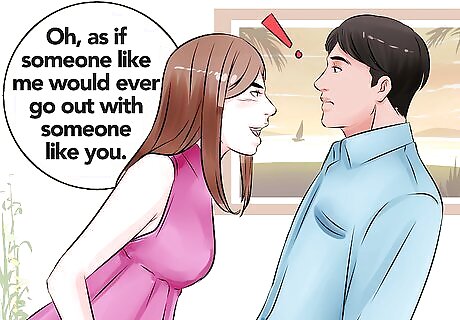
Don’t make a joke out of it. You’ll be inclined to want to keep things light, but if you go too far -- making a silly voice or face, quoting lines from a movie, etc. -- the other person will probably just think you are insulting him or her. Don’t seem like a jerk when you’re trying to be a nice guy/gal. Be careful with sarcasm. It may be obvious sarcasm to you to say "Oh, as if someone like me would ever go out with someone like you" with a fake, highfalutin voice and appropriate smirk at the end, and maybe the other person would usually get the joke as well, but he/she may not pick up on it while reacting to being rejected.
Rejecting Someone Who Won't Be Rejected
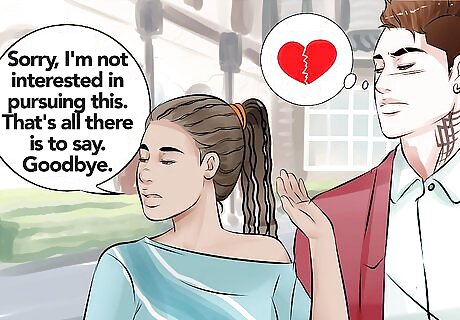
Forget what you have learned, if necessary. If you’re stuck trying to reject someone who can’t take a hint, won’t take no for an answer, or is just a creep who won’t leave you alone, you may not have the luxury of kindness. Just get things done quickly and safely. "I'm sorry, I'm not interested in pursuing this further, and that's all there is to say. Good luck and goodbye."
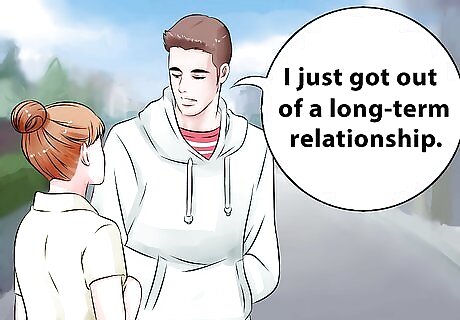
Lie carefully, if you have to. A good “poker face” will help; if you know you’re a terrible liar, it’s probably best just to skip trying. Lie as little as you think you need to. A smaller lie is easier to sell than a big one. Trot out that fake phone number or fake boyfriend/girlfriend if you need to. Or try (“I” focused) statements like “I just got out of a long-term relationship;” “I don’t date outside of my religion/culture;” or “I think you look too much like my brother/sister.”
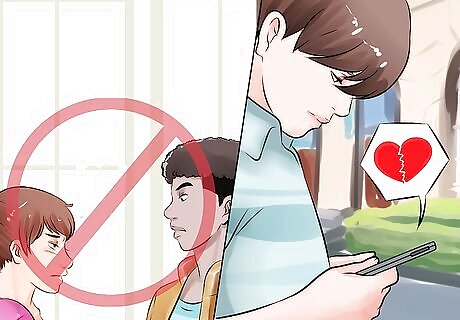
Don’t force a face-to-face rejection if you don’t have to. This is a situation where a text or email can suffice. Particularly if you have any concern that the person may lash out in anger at your rejection, feel free to place some distance between the two of you before doing what needs to be done.
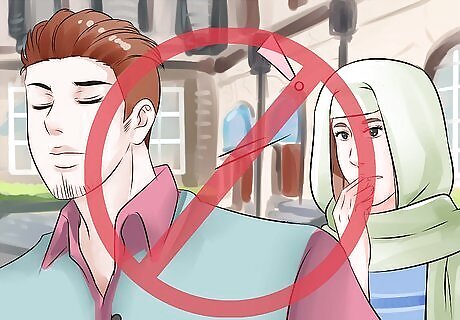
Don’t ignore the person and expect him/her to give up or go away. Some people simply need an absolutely clear, no-doubt, no-wiggle room, outright rejection to get the picture. Don’t hedge, don’t leave any seeds of uncertainty. As politely as you can, be blunt. Don’t ignore their texts/calls/emails until after you have clearly expressed your desire not to be involved. Once you’ve made yourself clear, then you can ignore their pleas, complaints, rants, etc. If you ever feel threatened or unsafe because of the other person, get help and/or contact the authorities. Some people really can’t handle rejection.

















Comments
0 comment